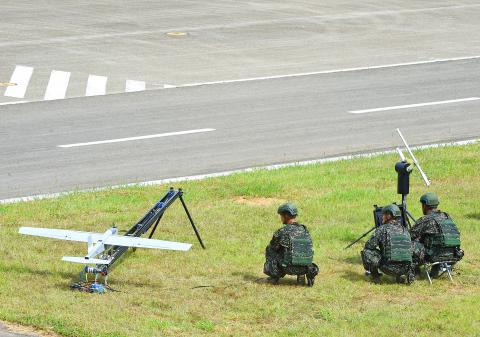The military is seeking to enhance cooperation with private-sector drone operators after civilian drones made an impressive performance in the 34th Han Kuang military exercises, a source said yesterday.
The latest iteration of the annual drill, which took place from June 1 to Friday last week, incorporated private drone operators and manufacturers, who flew reconnaissance missions in several stages, an official said on condition of anonymity.
Civilian drones and operators participated in the drills, with the latter incorporated into military units as uniformed personnel, an arrangement that delivered excellent results and was praised by the participants, the official said.

Photo: Liu Hsin-de, Taipei Times
As a result, the military is pursuing plans that would enhance military-private cooperation in drone operations, the official said, adding that the wartime mobilization of contracted civilian drone operators is among the proposals under consideration.
The military intends to compile a compendium of potential civilian drone assets and might sign open contracts with some to be on standby for wartime mobilization, the official said.
The nation’s annual military spending of US$10 billion is far less than China’s, and incorporating the private sector’s capabilities is an important step toward maximizing the nation’s resources, the official said, adding that capability gaps should be filled by private actors whenever possible.
For instance, civilian construction firms near air force bases were called on to participate in emergency runway repair drills during the exercise, the official said, adding that they also impressed the officials with their professionalism.
While the military is focusing on utilizing civilian capabilities for defense, incorporating contractors into the military’s mobilization plans remains controversial, the official said.
The military would need to comprehensively review its institutional practices before making such decisions, although it plans to make systematic changes to its mobilization plans, the official said.
In related news, the Civil Aeronautics Administration yesterday said that a forum on the innovative application of uncrewed aerial vehicles (UAVs) is to be held today to help the government stipulate rules of enforcement when an amendment to the Civil Aviation Act (民用航空法) takes effect in July next year.
Before the government enforces the new regulations, it needs to stipulate rules governing the registration, inspection and certification of UAVs, as well as operator certification, the agency said.
The public and the UAV industry are mostly concerned about how the government would oversee UAVs use and their operators, and whether it could help develop services that use UAVs, the agency said, adding that it is to solicit advice on these topics from participants.
Experts and industry representatives at the forum are to introduce systematic applications of UAVs in a wide range of areas, the agency said, adding that participants would also be informed about the latest trends in UAV technical development and rules of enforcement.

SECURITY: As China is ‘reshaping’ Hong Kong’s population, Taiwan must raise the eligibility threshold for applications from Hong Kongers, Chiu Chui-cheng said When Hong Kong and Macau citizens apply for residency in Taiwan, it would be under a new category that includes a “national security observation period,” Mainland Affairs Council (MAC) Minister Chiu Chui-cheng (邱垂正) said yesterday. President William Lai (賴清德) on March 13 announced 17 strategies to counter China’s aggression toward Taiwan, including incorporating national security considerations into the review process for residency applications from Hong Kong and Macau citizens. The situation in Hong Kong is constantly changing, Chiu said to media yesterday on the sidelines of the Taipei Technology Run hosted by the Taipei Neihu Technology Park Development Association. With

CARROT AND STICK: While unrelenting in its military threats, China attracted nearly 40,000 Taiwanese to over 400 business events last year Nearly 40,000 Taiwanese last year joined industry events in China, such as conferences and trade fairs, supported by the Chinese government, a study showed yesterday, as Beijing ramps up a charm offensive toward Taipei alongside military pressure. China has long taken a carrot-and-stick approach to Taiwan, threatening it with the prospect of military action while reaching out to those it believes are amenable to Beijing’s point of view. Taiwanese security officials are wary of what they see as Beijing’s influence campaigns to sway public opinion after Taipei and Beijing gradually resumed travel links halted by the COVID-19 pandemic, but the scale of

A US Marine Corps regiment equipped with Naval Strike Missiles (NSM) is set to participate in the upcoming Balikatan 25 exercise in the Luzon Strait, marking the system’s first-ever deployment in the Philippines. US and Philippine officials have separately confirmed that the Navy Marine Expeditionary Ship Interdiction System (NMESIS) — the mobile launch platform for the Naval Strike Missile — would take part in the joint exercise. The missiles are being deployed to “a strategic first island chain chokepoint” in the waters between Taiwan proper and the Philippines, US-based Naval News reported. “The Luzon Strait and Bashi Channel represent a critical access

Pope Francis is be laid to rest on Saturday after lying in state for three days in St Peter’s Basilica, where the faithful are expected to flock to pay their respects to history’s first Latin American pontiff. The cardinals met yesterday in the Vatican’s synod hall to chart the next steps before a conclave begins to choose Francis’ successor, as condolences poured in from around the world. According to current norms, the conclave must begin between May 5 and 10. The cardinals set the funeral for Saturday at 10am in St Peter’s Square, to be celebrated by the dean of the College